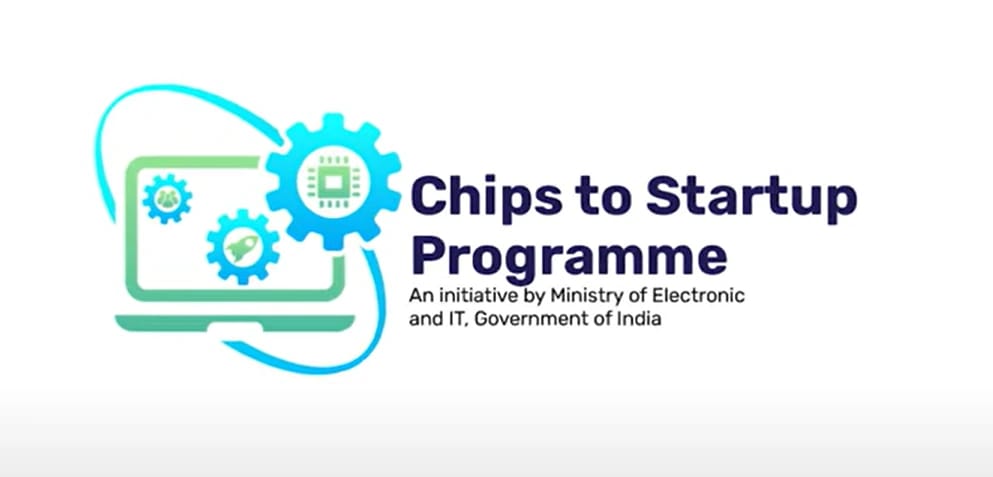
India’s Chip to Startup program is an initiative by the Indian government to boost semiconductor and display manufacturing in the country.
Chip to Startup program aims to:
- Develop specialized manpower in VLSI/Embedded System Design
- Train 85,000 engineers in the field of very large-scale integration (VLSI) and embedded system design of semiconductors
- Produce 175 ASICs (application specific integrated circuits)
- Create an IP core repository
- Produce functional prototypes of 20 systems on chips (SoC)

As part of the Chips to Startup program, developers are set to create 175 ASICs, and one noteworthy example focuses on artificial intelligence (AI) applications. This particular ASIC aims to enhance the performance of AI tasks like image recognition and natural language processing, finding application in diverse fields such as self-driving cars, facial recognition systems, and medical diagnosis.
The program also aims to address each entity of the Electronics value chain.
C2S has selected 104 institutions and organizations across the country. The program is a step in the right direction for India, as it will help to create jobs, boost the economy, and make India a global hub for semiconductor manufacturing.
Read More: Free EDA Tools, Financial Support & Fabrication with C2S scheme
Here is a more detailed look at the program, its goals, and its potential impact:
Background
The semiconductor industry is one of the most important industries in the world. The global semiconductor market, which encompasses applications in computers, smartphones, cars, and medical devices, is anticipated to achieve a $1 trillion valuation by 2030.
India is currently a major importer of semiconductors. In 2020, India imported $30 billion worth of semiconductors. The Indian government wants to reduce this reliance on imports and make India a global hub for semiconductor manufacturing.

Read More: Is India even serious about Semiconductor manufacturing?
Key Schemes Driving the Initiative
Seed Funding for Startups: Startups in the VLSI sector often face significant initial capital requirements for research, development, and prototype creation. The government, through various agencies, offers financial support to promising startups.
Incubation Centres: To provide a conducive environment for innovation, the “Chip to Startup” program establishes incubation centres across the country. These centres serve as hubs where startups can access state-of-the-art facilities, mentorship, and collaboration opportunities.
Skill Development Initiatives: Recognizing the need for a skilled workforce training programs, workshops, and collaborations with academic institutions aim to equip individuals with the necessary expertise in chip design, fabrication, and testing.
It is worthy to note that a project from the received proposals is allotted to a cluster of 3/4 institutions and each of these institutions receives government procured EDA tools such as the Cadence design suite, Synopsys and Mentor Graphics.
For example, a group consisting of NIT Jamshedpur, IIEST Shibpur, NIT Jalandhar led by NIT Rourkela have been allotted a project which aims to develop an ASIC for an IoT based safety system for Industry 4.0.
Research and Development Grants: To encourage research and innovation in semiconductor technology, the program offers grants to research institutions and universities.

Read More: What is the Progress of Semiconductor Ecosystem in India in Last 2 years?
Potential impact
The Chips to Startup program has the potential to have a major impact on the Indian economy. The program is expected to create 85,000 jobs and boost the Indian economy by $100 billion over the next five years.
The program will also help to make India a global hub for semiconductor manufacturing. This will reduce India’s reliance on imports and make India more self-reliant.
Challenges
There are a number of challenges that the Chips to Startup program will need to overcome in order to be successful. These challenges include:
- The lack of skilled manpower in the semiconductor industry
- The high cost of semiconductor manufacturing
- The global competition in the semiconductor industry
The Indian government is aware of these challenges and is taking steps to address them. The government is investing in education and training to create a skilled workforce. The government is also providing financial incentives to semiconductor companies to set up manufacturing facilities in India.
The Chips to Startup program is a bold and ambitious initiative. If successful, the program will have a major impact on the Indian economy.
Conclusion
The Chips to Startup program is a major step forward for India’s semiconductor industry. The program has the potential to create jobs, boost the economy, and make India a global hub for semiconductor manufacturing.








